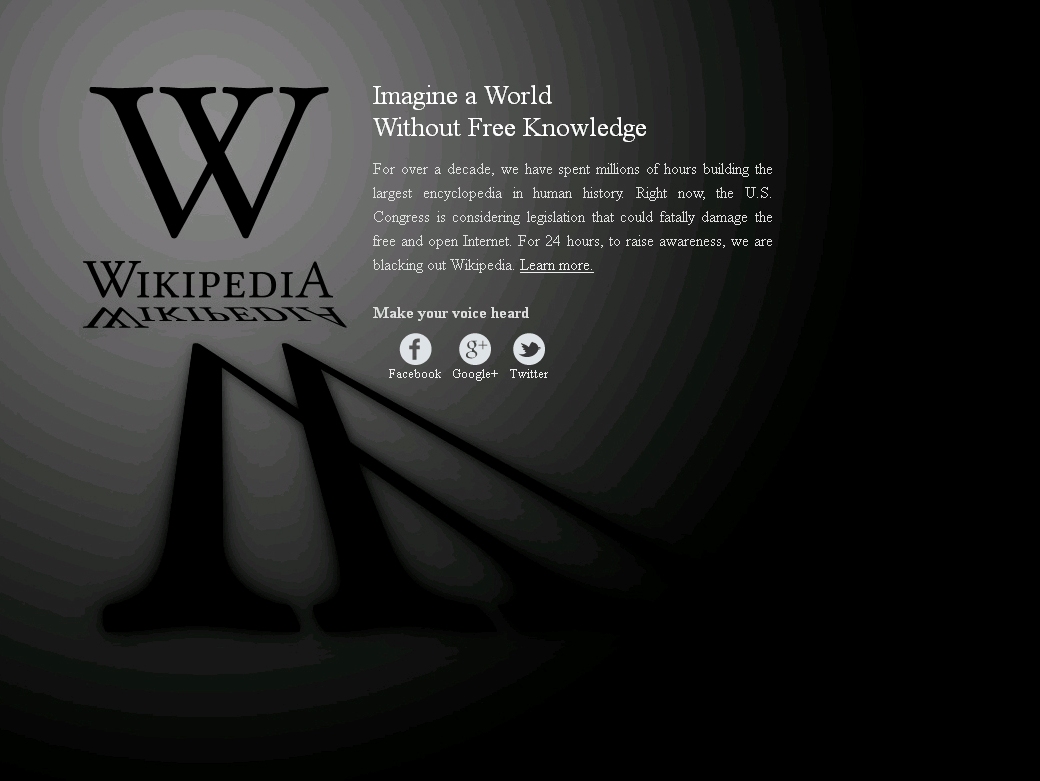
This week, the internet turned black: high-profile sites including Wikipedia went into mourning mode to protest the controversial SOPA and PIPA anti-piracy legislation in the US. As Chris Smith explains, "The Stop Online Piracy Act, and Protect Intellectual Property Act currently being debated in the US Senate would give content providers the right to have websites shut down if they believed they were infringing on copyrighted material."
The blackout attracted widespread support from the likes of Mark Zuckerberg - although not so much support that Facebook actually took part in any protest - but not everybody was entirely in favour: Twitter CEO Dick Costolo posted that "closing a global business in reaction to single-issue national politics is foolish."
There's no doubt that the protests have been very popular, but our columnist Gary Marshall sparked a furious debate when he worried that the bigger picture was being missed.
"SOPA's been shelved and PIPA will no doubt suffer the same fate, but these are tactical withdrawals, not outright surrender," he writes. "They'll be back with new names, and new language, and the same old supporters, because that's what's been going on for more than a decade.
"Copyright industries want the net regulated, and they're willing to spend huge sums to make it happen: SOPA is a battle, but the lobbyists are waging a war."
Victim of a treaty
One victim of that war is Richard O'Dwyer, a 23-year-old student from Sheffield who faces extradition to the US. His crime? Allegedly profiting from linking to - not hosting, but linking to - dodgy downloads of TV programmes.
The alleged crime didn't happen in the US and his servers weren't located in the US, yet O'Dwyer may be "bundled onto a plane and sent to America, with its famously pleasant prisons and scrupulously fair and incorruptible legal system", as Marshall describes it.
Get daily insight, inspiration and deals in your inbox
Sign up for breaking news, reviews, opinion, top tech deals, and more.
O'Dwyer isn't a victim of SOPA - that's US-only - but of the extradition treaty between the US and UK, a treaty that both Nick Clegg and David Cameron promised to amend should they gain power. The treaty was set up to fight terrorism, but it's now being used by US copyright owners to go after people in the UK.
It's a classic case of mission creep, where laws end up being used for very different things than they were originally intended - and mission creep is a key concern among critics of our Digital Economy Act and the US's SOPA and PIPA. If a law can be used for something, they worry, it eventually will be.
While everyone from Joe Punter to President Obama slams SOPA for going too far, in the UK the Film Policy Review Panel reckons Britain hasn't gone far enough and that the Digital Economy Act needs to get some teeth. Marc Chacksfield explains:
"The UK's Film Policy Review Panel is seemingly fed up with the government dilly dallying over the Digital Economy Act (DEA) and its anti-piracy proposals, asking for measures to be put in place 'as soon as possible'... according to Ofcom, the controversial 'three strike' plan won't come into effect until at least 2013 and that is only if it gets approval."
The worrying thing about the copyright debate both here and in the US is that it's becoming increasingly polarised, and in the coming months it'll get even more so: copyright industries believe they should be protected from the internet, while internet users believe it should be protected from the copyright industries. SOPA - and over here, the Digital Economy Act - do appear to give disproportionate weight to the concerns of big businesses rather than ordinary internet users.
Part of the problem, Marshall argues, is that politicians are only hearing one side of the story. "While we're outside shouting slogans, The Man is inside, whispering sweet nothings into politicians' ears," he writes.
"That lobbying isn't generally coming from supporters of internet freedom." The answer, he suggests, isn't just about protesting; it's about "supporting the EFF, and the ACLU, and the ORG, [and] lobbying your elected representatives... we need to do better, because the best way to fight bad laws is to stop clowns from getting into power in the first place."
---------------------------------------------------------------------------------------------------
The TechRadar hive mind. The Megazord. The Voltron. When our powers combine, we become 'TECHRADAR STAFF'. You'll usually see this author name when the entire team has collaborated on a project or an article, whether that's a run-down ranking of our favorite Marvel films, or a round-up of all the coolest things we've collectively seen at annual tech shows like CES and MWC. We are one.